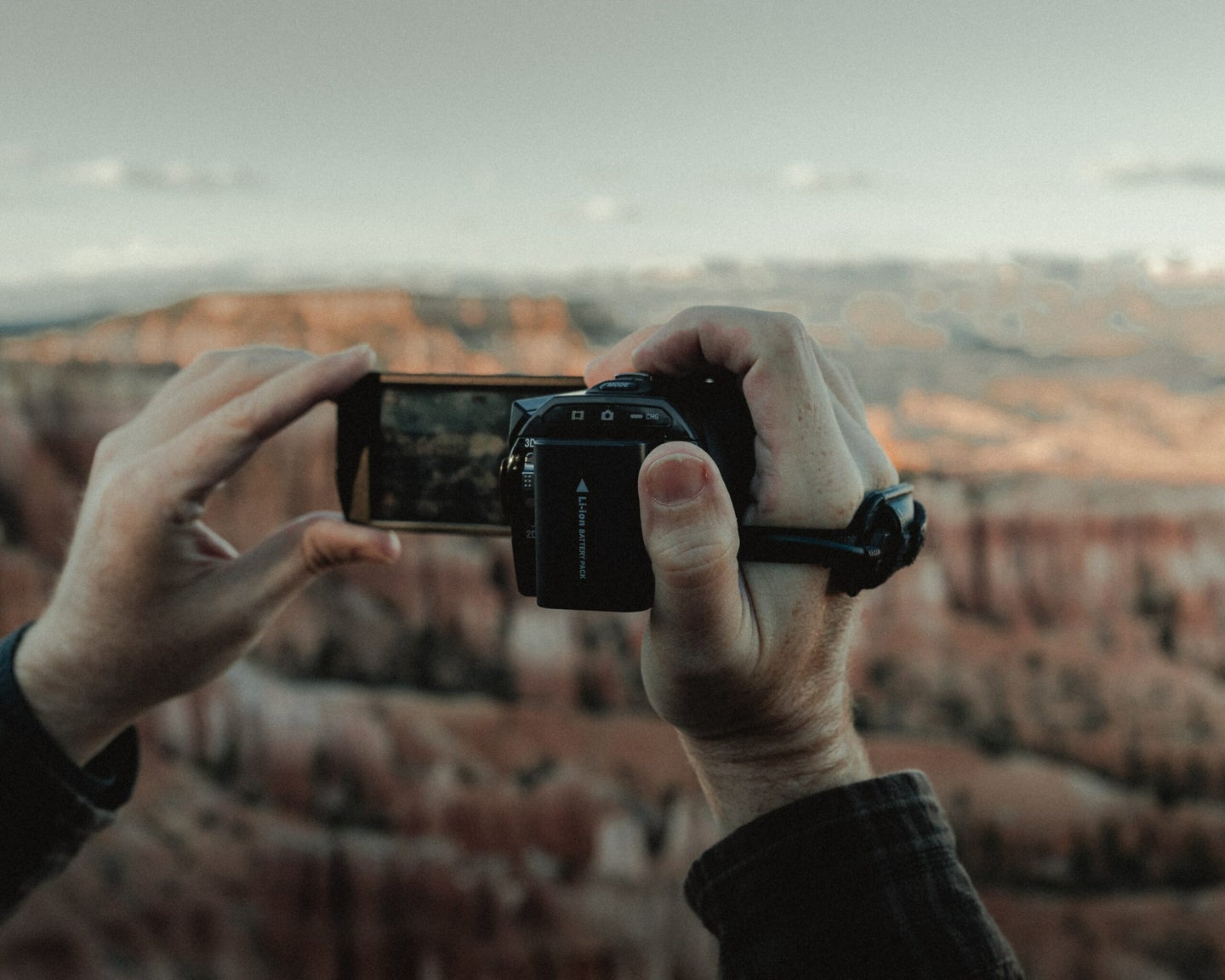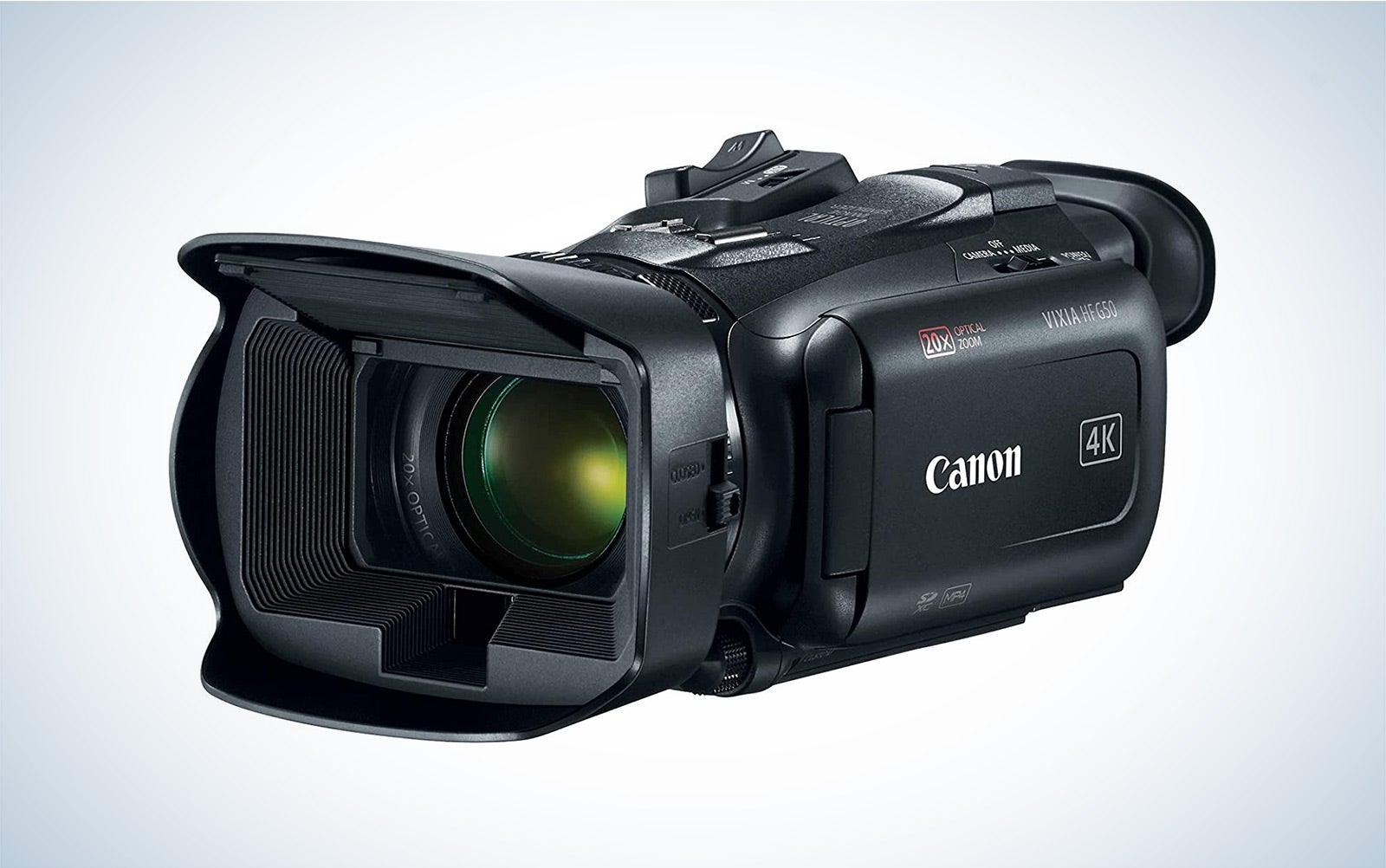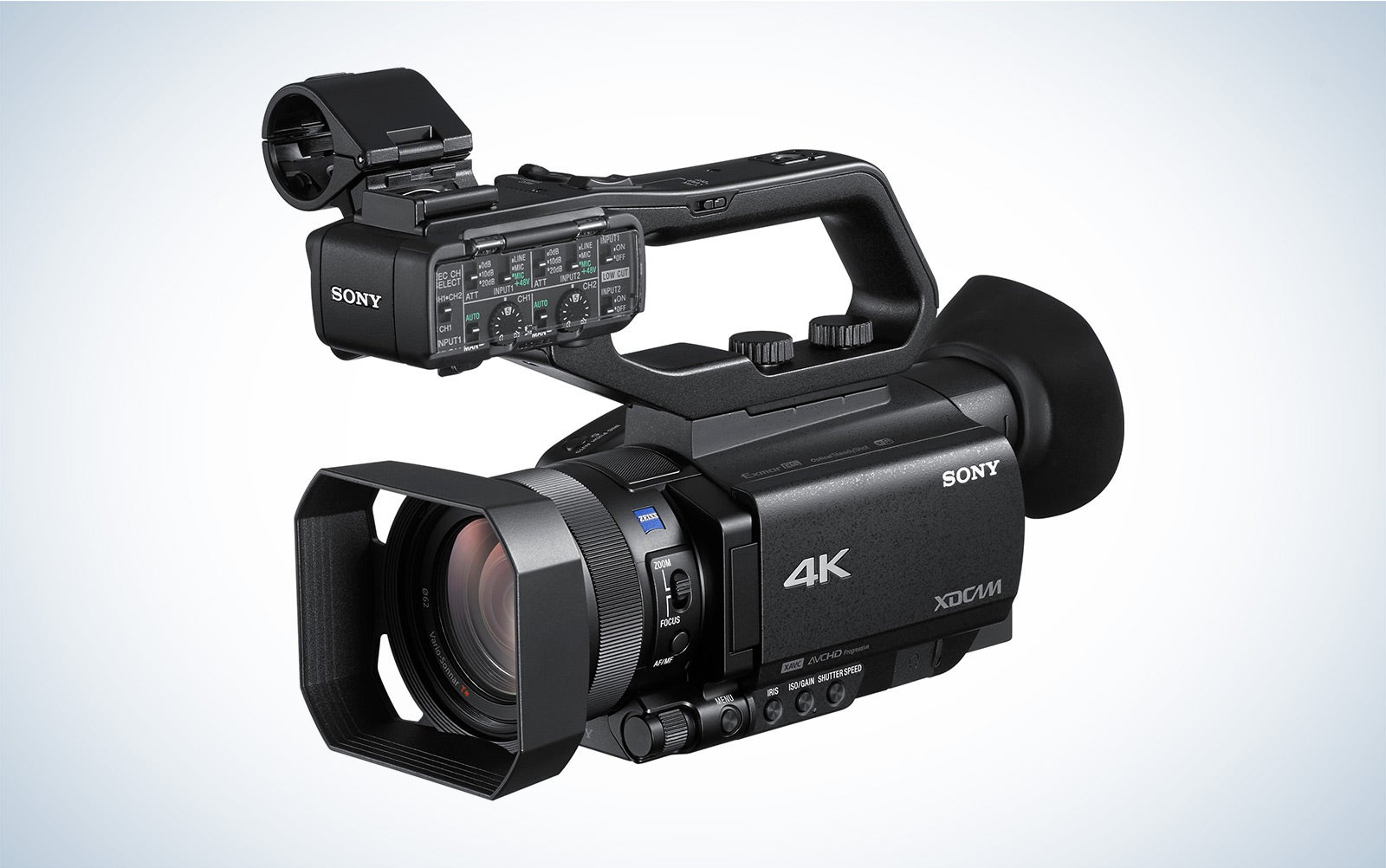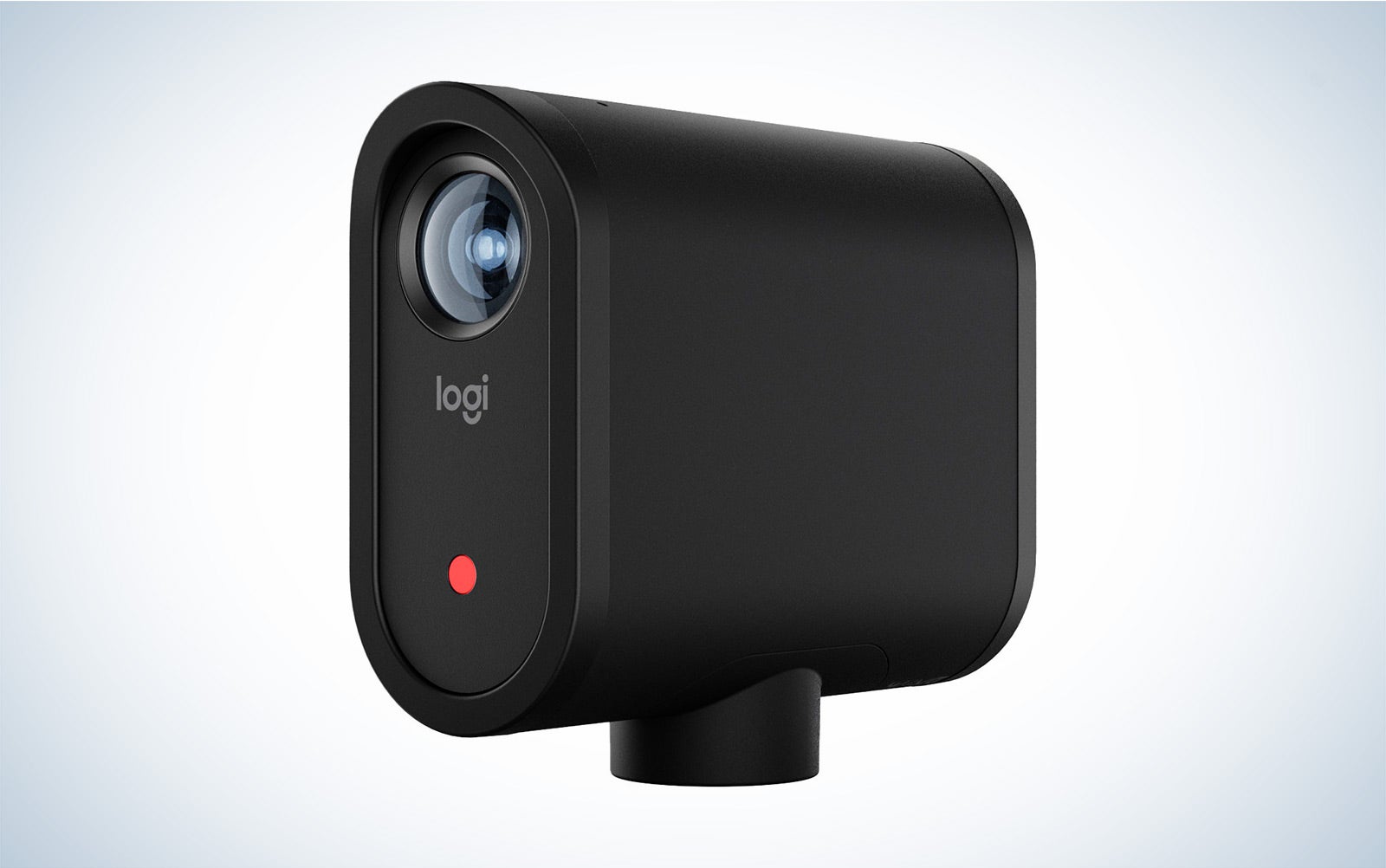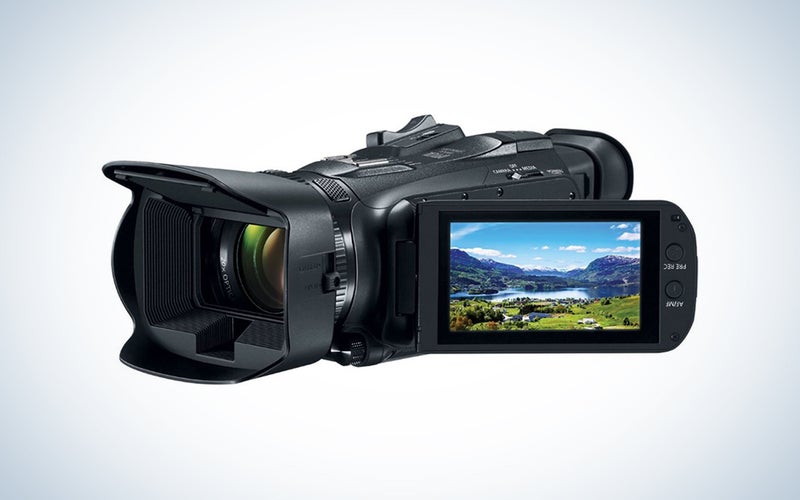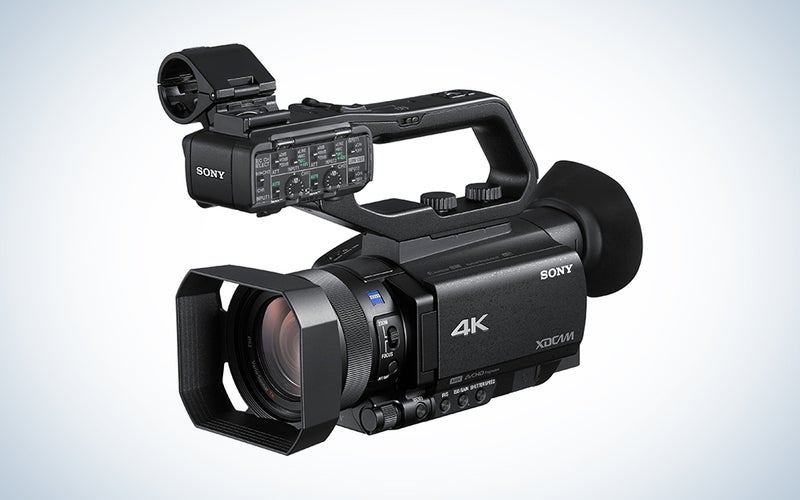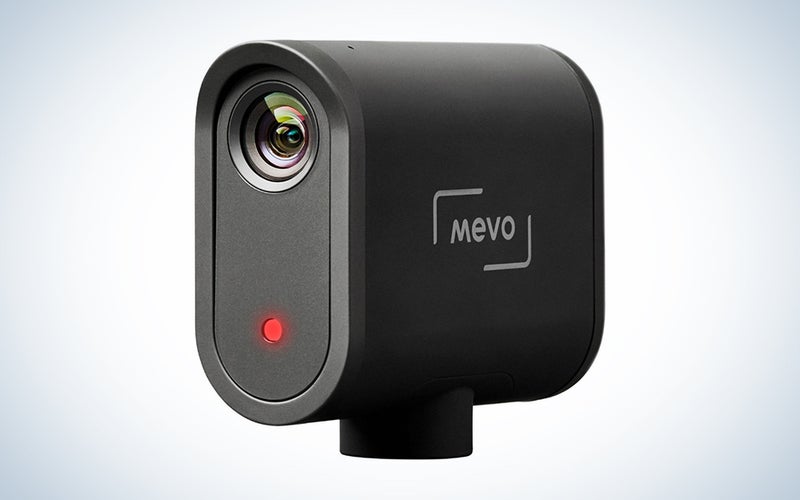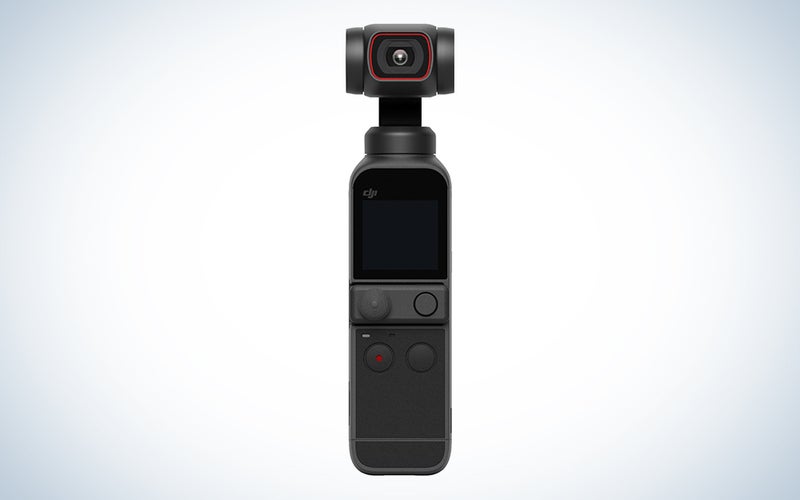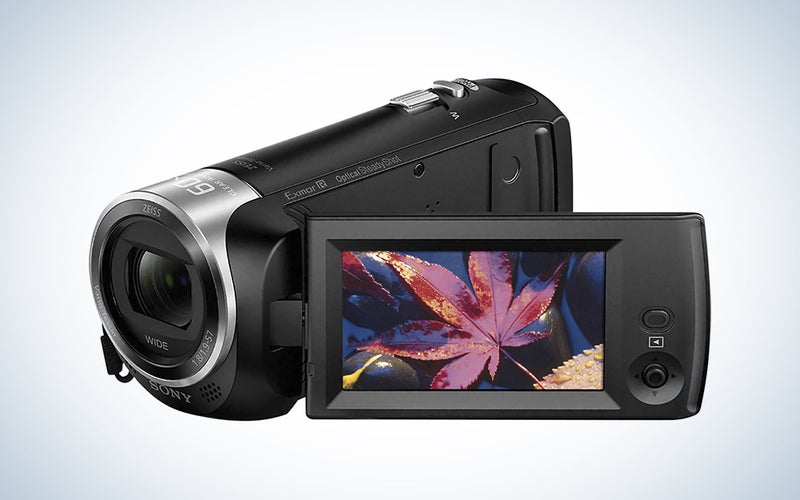We may earn revenue from the products available on this page and participate in affiliate programs. Learn more ›
So you plan on shooting video of your family on your next vacation, or a movie for an upcoming short film festival, and you’re never quite satisfied with what your smartphone captures. Well, choosing the best camcorders can be a viable choice for a variety of reasons.
The word “camcorder,” a combination of “camera” and “recorder” was used for a long time to describe a product that both shot and recorded video footage at the same time. Nowadays, with improved technology all around, most camera equipment—cinema-cams, DSLRs, and even your smartphone—has these built-in capabilities, so the factors that set the camcorder apart have changed.
When we talk about the best camcorders today, we talk about small cameras intended specifically for video, often with a built-in zoom lens, lens hood, microphone, monitoring screen, and more. While they may not be perfect for every project, the best camcorders are amazing for projects where you want to minimize your overall camera gear or want to shoot for extended periods of time, as camcorders won’t automatically stop recording video after 10 to 30 minutes (like many still photography-focused cameras).
Now that you know if a camcorder is right for you, however, you might have a new challenge: how to choose. With so many built-in tools, suddenly you feel like you have to be an expert in topics including sensors, lenses, mechanical vs. digital zoom, effective pixels, aperture sizes, SSD drives, audio jacks, and microphone options—well, you get the picture. And that’s ultimately all you want: the picture. So take a deep breath. Here are our suggestions for best camcorders—all you need to know is what you want to shoot once you pick one.
- Best for beginners: Canon VIXIA HF G50 Premium 4K Camcorder
- Best for filmmaking on a budget: Sony XDCAM PXW-Z90V 4K Premium Camcorder
- Best for livestreaming: Mevo Start
- Best for action: DJI Pocket 2
- Best budget: Sony Handycam CX405 Flash Memory Camcorder
The best camcorders: Reviews & recommendations
Best for beginners: Canon VIXIA HF G70 Premium 4K Camcorder
Best Buy
This Canon model is the best camcorder because it is built light and portable without compromising on features. It is small enough to hold comfortably in a single hand, has a 20x optical zoom, and 4K resolution. Its tiltable viewfinder, optical stabilization, and automatic focus features allow for easy and convenient day-to-day use, while simultaneously recording beautiful footage.
Best for filmmaking on a budget: Sony XDCAM PXW-Z90V 4k Premium Camcorder
Best Buy
This Sony camcorder is built with all of the essential features a professional filmmaker would need for an important shoot making it our choice for best camcorder for filmmaking. It shoots 4K footage through an Exmor RS CMOS sensor that is built to prevent light blockage from traditional camera wiring and it has four separate built-in ND filters so you can have more control over the amount of light in your shots. The camcorder has two XLR inputs, as well as a stereo mini-jack, so you can ensure quality audio by using multiple inputs. It also has dual media slots to allow for long periods of shooting. While it may be more expensive than some other consumer-targeted camcorders, this model is the best camera for filmmaking on a budget because it’s much more versatile and capable than many others on the market.
Best for livestreaming: Mevo Start
Best Buy
Whether you plan on livestreaming your outdoor adventures, your gaming sessions, or simply your 9 am meetings, this best camcorder from Mevo Start has you covered. This single device is designed to function as all the camera equipment you might need for a production studio: it has microphones that can pick you up clearly from even 10 feet away, a wide-angle camera that connects to a remote control app on your smartphone, and the ability to stream directly to popular platforms, such as Facebook, YouTube, Instagram, Twitch, and more. This camcorder has a six-hour battery life, and can livestream using your at-home internet connection, or the internet connection on your phone; that means you can stream high-quality footage with simplicity anywhere that you receive cell phone service.
Best for action: DJI Pocket 2
Best Buy
The DJI Pocket 2 is a camcorder and gimbal all in one. While it’s small enough to hold in your hand like a popsicle, it packs a 4K video camera on top of a three-axis gimbal for insanely smooth Steadicam-like footage. DJI has also designed a lot of accessories for this product, so no matter how you plan on using the camera there is likely a tool to help you properly and safely mount, protect, and control your new device.
Best budget: Sony Handycam CX405 Flash Memory Camcorder
Best Buy
While Sony’s Handycam may not come with a multi-thousand-dollar price tag, it does come with plenty of essential hardware to keep your footage looking stellar. It has a CMOS sensor—just like many other expensive camcorders—that is capable of shooting 1080p HD footage. It has optical stabilization to keep your camera steady, and an LCD display that can face you from behind the camera, or in front of it. The biggest setback with this camera will be its low-light shooting. It has a relatively closed aperture, and may not always shoot clear footage at night or indoors.
How to shop for the best camcorders
Before you buy camera gear, ask yourself what you want to shoot and where you want to be shooting it. Once you know the answers to these questions, your process in searching for the appropriate camera equipment will become significantly more simple, because you’ll be able to better narrow down your own specific needs and concerns rather than trying to figure out the effective differences between every little piece of hardware built into these tools. Do you need the best camcorder for YouTube videos? Do you need the best camera for vlogging? The best camera for filmmaking on a budget? Whether you need the best 4K video camera or the best video camera for beginners, there’s a model to match your needs.
Related: Here’s how to trick out a DSLR for maximum movie production
Do you plan on using your camcorder for every-day purposes?
Maybe you’re looking for the best camcorder to collect footage for an upcoming personal event or an important moment in your life that you’re anticipating, but you don’t consider yourself much of a cinephile. Luckily, the best video camera for beginners simply allows you to capture memories without being so much of a hassle that it takes you out of those special moments completely. If you simply want quality footage that’s easy to capture, look for a few things.
For starters, make sure your camera equipment has good resolution. This means the box will say something like “Full HD” or “1080p”—these words both mean the same thing, and simply describe resolution equivalent to a high-quality YouTube video, for example. Any number above 1080 (for example, 4K) is good, and some may even be overkill. You do not want, however, a resolution lower than 1080.
Next, look for features to take your mind off of the details of shooting. “Autofocus” will help keep your footage sharp. “Stabilization” will help keep your footage smooth. And a large “optical zoom” will allow you to see things more closely without having to move. The best video camera for beginners may not be the cheapest, but it’s the most worry-free.
Do you plan on using your camcorder to shoot a movie?
Looking for the best camera for filmmaking on a budget? In this case, you’ll need to look for a few different features. When it comes to resolution, you won’t want just a “high-definition” camcorder; you’ll need the best 4K video camera. This is for two reasons: you’ll be able to blow this footage up on a larger screen when it’s time to premiere your work, and you’ll be able to punch into your shots during post-production, which will save you time—and money—since you won’t be needing to grab every possible close up on set.
You’ll also want to ensure maximum control over the light in your shots. You’ll want a large aperture to capture as much light as possible when needed, as well as a sensor that works well in low-light. On the other end of the spectrum, you’ll also likely want some built-in ND filters to block out light sources that are too strong, perhaps in your exterior shots. In addition to your camera’s visual functionality, it’s essential to not gloss over the sound. Instead of a typical audio aux jack, you’ll likely want a camcorder that allows you to plug in an XLR for a higher-grade microphone, and therefore higher-grade audio.
Finally, take a look at memory. If you plan on shooting longer slower shots with fewer cuts, consider getting a camcorder that allows you to use multiple memory sources at once. These camcorders will automatically switch cards once one becomes full, so you won’t have to worry about stopping a good take because of memory limitations.
Do you plan on going live?
If you’re looking for the best camera for vlogging, have an active social media presence, or simply do a lot of Zoom meetings, you’re going to have a specific set of features you need for livestreaming. This type of camera gear can sometimes be difficult to find because while many livestreaming camcorders can collect amazing footage, they require complicated setups, software, or camera builds. Especially if you’re working solo, the last thing you want is for your livestream to shut down because of complicated technical difficulties that were too difficult to manage while simultaneously speaking with your audience. So while you’ll want to look for some features similar to other products listed here, such as Full HD resolution, and high-quality audio capturing, you’ll also likely want to keep simplicity in mind when looking for the best camera for vlogging.
Will you be taking a lot of action shots?
If you’re planning to shoot a lot of moving footage, there are a lot of great action camcorders on the market, too. Here, one feature is absolutely key. While some other types of shooting might get away with less intense stabilizing features, if you’re shooting busy, fast action shots where your subject and camera may be moving around quite a bit, you’ll want to make sure your camera at least is equipped with some sort of optical stabilization. Depending on what specifically you’ll be shooting, you may also want to consider the action camcorder’s mounting features so that you can go hands-free if needed.
Looking for the best camcorder that doesn’t break the bank?
A lot of the best camcorders can be relatively expensive—even on the most affordable end, you can expect to pay a few hundred dollars. However, just because you’re not willing to spend $3,000 on a new toy doesn’t mean you can’t still capture awesome footage. There are plenty of amazing products even within that lower price range and, at the end of the day, many of them use identical pieces of essential hardware. So, even if you’re working with a budget, you can still get awesome footage from an affordable camcorder.
FAQs
Q: Are camcorders good for filmmaking?
The answer to whether cameras are good for filmmaking could be yes or no; it all depends on what exactly you’re trying to shoot, and what you want for the final look of your project. The main question you should ask yourself when deciding if a camcorder would be ideal for your upcoming shoot is how much control you will need over your depth of field. If you’re not familiar with depth of field, this simply means the amount of artistic blur in the background of an image. If you’re trying to achieve that popular cinematic look, then even the best 4K camcorder on the market is going to have a difficult time delivering your goals. This is simply because camcorders often have a fixed lens with a higher aperture, and because they often have smaller sensors. So, if this is what you’re going for, you should consider looking for a digital cinema camera, or even a DSLR or mirrorless camera with a large sensor. If the project you’re working on, however, is supposed to have a more deep, gorilla, documentary aesthetic, then the best camera gear for your shoot very well could be a camcorder.
Q: How long do camcorder batteries last?
The amount of time you get out of your camcorder’s battery life depends on both the type of battery in your camcorder and how you intend to use your camcorder. Many camcorders have removable batteries; if you’re going to be shooting for a long period of time, you should always carry a few fully charged backup batteries to alleviate concerns about how long your camera will last. Your camcorder may also be equipped to use AC power—meaning that it can be plugged into a wall while shooting rather than having to maintain its own charge. If your camera has this option, and you’re shooting inside, then using AC power will allow you to shoot endlessly without having to worry about replacing batteries.
Q: Which camcorder format is best?
The format can mean two things: for camcorders, in particular, the format can refer to what type of hardware your camcorder uses for memory and, in all cameras, the format can also refer to the size of an image sensor. Most modern camcorders record to solid-state drives (SSDs), and/or have a slot for removable Secure Digital (SD) cards. Both offer a memory type fast enough to capture 4K video, while cameras that take SD cards allow for expandable storage. As for the camera’s sensor, you’ll likely want one that lets you shoot in that memory-hungry 4K format. This will allow you to “punch in” and re-frame your shots in post-production without noticing any significant quality loss.
Related: Want to up your vacation photos game? Here are the best travel-friendly cameras
The last word on the best camcorders
- Best for beginners: Canon VIXIA HF G50 Premium 4K Camcorder
- Best for filmmaking on a budget: Sony XDCAM PXW-Z90V 4K Premium Camcorder
- Best for livestreaming: Mevo Start
- Best for action: DJI Pocket 2
- Best budget: Sony Handycam CX405 Flash Memory Camcorder
The best camcorders out now come packed with features to lighten your load and alleviate your worries as you shoot. Whether going live, collecting footage from a family gathering, or shooting your first short film, there’s sure to be a camcorder on the market that fits your needs.
Why trust us
PopPhoto has a long history of delivering the opinions of some of the sharpest and most prolific camera dorks the world has to offer. Since 1937, we’ve been reviewing cameras, providing wisdom from well-known photographers, and generally just nerding out about all that goes into making great pictures. Our current crop of writers and editors have decades of professional photography and camera writing experience among them. Collectively, we’ve probably shot with just about every camera and lens combo you can imagine—as well as some obscure stuff you may not even know about. Remember the Casio Tryx folding camera? PopPhoto does.
We also get that buying a camera is a big decision, which is why we’re dedicated to helping folks choose the right one (or, in our case “ones”) for their needs. Case in point: Handing over top dollar for an expensive rig may leave you unsatisfied if it doesn’t fit your preferred shooting style. Sure, a $6,000 sports-oriented DSLR can capture landscapes, but do you really need to do it at 30 frames-per-second? No, you don’t.
